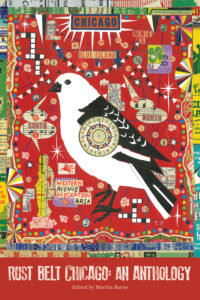Hypertext Magazine asked Martha Bayne, editor of Rust Belt Chicago anthology, “What question do you wish you’d been asked about this anthology and/or about your own writing?”
What does any one thing have to do with the others?
So, this is a question that speaks not just to Rust Belt Chicago, the anthology I edited, but to my work in general, over the past ten or so years.
In pulling together Rust Belt Chicago I started with the model of Belt’s other anthologies, which collect writing from smaller cities like Akron and Youngstown that have smaller literary communities, and about which not so much has been written. But, obviously, that model doesn’t hold in Chicago, about which there has been a great deal written over the years, and in which can be found a whole lot of writers.
The call for submissions asked for work “about Chicago’s relationship to the Rust Belt” but even that is pretty broad as an organizing idea. So I started looking for common threads in the material I was getting. The result is all over the map to a degree unlike any anthology we’ve published so far, I think – a mix of essays, fiction, journalism, and poetry.
It makes sense to me why every piece is in the book – how they all fit in the puzzle — but I’m very curious at this point to see if it makes sense to an outside eye. Many of the connections are not obvious. But the pieces speak, directly and indirectly, to some of the commonalities Chicago shares with other cities in the region – the Great Lakes ecosystem, for one; the built (and decaying) infrastructure of the city; the legacy of deindustrialization; the shared experience of segregation and police violence; and migration and movement.
I’d like to think that beyond this book my work in general evidences a similar sort of through line – though sometimes even I’m at a loss to say what it is. Like a lot of writers I’m a scavenger; different subjects and stories catch my attention at different moments and in different contexts. And even beyond that I’m not genre specific; I’ve been a journalist most of what counts as a career, but also an essayist, and an editor of long-form nonfiction, and I wrote a cookbook. And now I’m trying to write a short play, in the form of a haunted house. Sometimes it doesn’t make sense to me at all, let alone to an outsider, and I worry that having diverse interests doesn’t mean I’m some sort of polymath (as I’d perhaps like to think at times) it just makes me unable to focus. But if I step back and breathe a little I think there’s a thread to follow. Most everything I’ve done in the past on the page and in other practices, circles back in some way to basic questions about how to live a good life; how to push back against dominant narratives; how to honor what’s true. So whether it’s a soup cookbook or a haunted house or an anthology of writing about Chicago, it’s all coming from the same place of curiosity, and maybe wonder.
